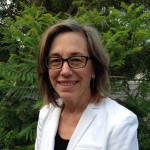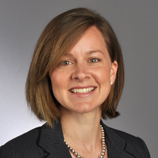Below are the biographies for CAP’s Art of Social Change: Child Welfare, Education, and Juvenile Justice fall 2015 speakers.
- Class 1 (Sep 10): Elizabeth Bartholet & Cheryl Bratt
- Class 2 (Sep 17): Charles Nelson
- Class 3 (Sep 24): Jill Duerr Berrick & Kristen Shook Slack
- Class 4 (Oct 1): Neil MacInnes-Barker, Sam Greenberg, & Sarah Rosenkrantz
- Class 5 (Oct 8): Emily Kernan, Jesse Hahnel, & Jessica Berry
- Class 6 (Oct 15): Erin Corcoran, Elizabeth Badger, & Sandra Cañas
- Class 7 (Oct 22): John Affeldt & Roberta Furger
- Class 8 (Oct 29): Amy O’Leary, Alice Peisch, & Jason Sachs
- Class 9 (Nov 5): Jens Ludwig
- Class 10 (Nov 12): David Deakin, Joshua Dohan, & Michael Dsida
- Class 11 (Nove 19): Felicia Ellsworth, Christopher Looney, & Thomas Kane
- Class 12 (Dec 3): Anthony Watson, Anthony Ramirez-Di Vittorio, & Gail Day
Elizabeth Bartholet
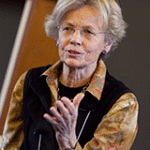 Elizabeth Bartholet is the Morris Wasserstein Public Interest Professor of Law and Faculty Director of the Child Advocacy Program (CAP) at Harvard Law School, where she teaches civil rights and family law, specializing in child welfare, adoption and reproductive technology. Before joining the Harvard Faculty, she was engaged in civil rights and public interest work, first with the NAACP Legal Defense Fund, and later as founder and director of the Legal Action Center, a non-profit organization in New York City focused on criminal justice and substance abuse issues.
Elizabeth Bartholet is the Morris Wasserstein Public Interest Professor of Law and Faculty Director of the Child Advocacy Program (CAP) at Harvard Law School, where she teaches civil rights and family law, specializing in child welfare, adoption and reproductive technology. Before joining the Harvard Faculty, she was engaged in civil rights and public interest work, first with the NAACP Legal Defense Fund, and later as founder and director of the Legal Action Center, a non-profit organization in New York City focused on criminal justice and substance abuse issues.
Cheryl Bratt
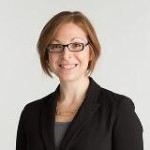 Cheryl Bratt is a Lecturer on Law and the Assistant Director of Harvard Law School’s Child Advocacy Program (CAP). Before joining CAP, she was a fellow at the University of Michigan Law School’s Pediatric Advocacy Clinic where she supervised students litigating family and special education cases, and she worked as a litigation senior associate at WilmerHale LLP in Boston, Massachusetts where she represented parties at the trial, appellate, and U.S. Supreme Court level. She clerked on the U.S. District Court for the Eastern District of Pennsylvania and the U.S. Court of Appeals for the First Circuit.
Cheryl Bratt is a Lecturer on Law and the Assistant Director of Harvard Law School’s Child Advocacy Program (CAP). Before joining CAP, she was a fellow at the University of Michigan Law School’s Pediatric Advocacy Clinic where she supervised students litigating family and special education cases, and she worked as a litigation senior associate at WilmerHale LLP in Boston, Massachusetts where she represented parties at the trial, appellate, and U.S. Supreme Court level. She clerked on the U.S. District Court for the Eastern District of Pennsylvania and the U.S. Court of Appeals for the First Circuit.
Charles Nelson
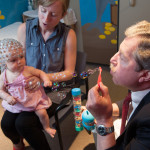 Charles Nelson is Professor of Pediatrics and Neuroscience and Professor of Psychology in the Department of Psychiatry at Harvard Medical School. Elsewhere at Harvard he holds faculty appointments in the Harvard School of Public Health and the Harvard Graduate School of Education, and sits on the steering committee for the Harvard Center on the Developing Child and the Harvard inter-faculty initiative on Mind, Brain, and Behavior. In addition, he holds the Richard David Scott Chair in Pediatric Developmental Medicine Research at Boston Children’s Hospital, and is Director of Research in the Division of Developmental Medicine. His research interests center on a variety of problems in developmental cognitive neuroscience, including: typical and atypical memory development; the development of social perception; developmental trajectories to autism; and the effects of early adversity (including psychosocial deprivation) on brain and behavioral development. He chaired the John D. and Catherine T. MacArthur Foundation Research Network on Early Experience and Brain Development, and served on the National Academy of Sciences (NAS) panels that wrote From Neurons to Neighborhoods, and more recently, New Directions in Child Abuse and Neglect Research. Among his many honors he has received the Leon Eisenberg award from Harvard Medical School, an honorary Doctorate from Bucharest University (Romania), was a resident fellow at the Rockefeller Foundation Bellagio Center (Italy), and has been elected to the American Academy of Arts and Sciences.
Charles Nelson is Professor of Pediatrics and Neuroscience and Professor of Psychology in the Department of Psychiatry at Harvard Medical School. Elsewhere at Harvard he holds faculty appointments in the Harvard School of Public Health and the Harvard Graduate School of Education, and sits on the steering committee for the Harvard Center on the Developing Child and the Harvard inter-faculty initiative on Mind, Brain, and Behavior. In addition, he holds the Richard David Scott Chair in Pediatric Developmental Medicine Research at Boston Children’s Hospital, and is Director of Research in the Division of Developmental Medicine. His research interests center on a variety of problems in developmental cognitive neuroscience, including: typical and atypical memory development; the development of social perception; developmental trajectories to autism; and the effects of early adversity (including psychosocial deprivation) on brain and behavioral development. He chaired the John D. and Catherine T. MacArthur Foundation Research Network on Early Experience and Brain Development, and served on the National Academy of Sciences (NAS) panels that wrote From Neurons to Neighborhoods, and more recently, New Directions in Child Abuse and Neglect Research. Among his many honors he has received the Leon Eisenberg award from Harvard Medical School, an honorary Doctorate from Bucharest University (Romania), was a resident fellow at the Rockefeller Foundation Bellagio Center (Italy), and has been elected to the American Academy of Arts and Sciences.
Jill Duerr Berrick
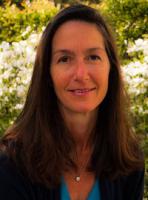 Jill Duerr Berrick serves as the Zellerbach Family Foundation Professor in the School of Social Welfare and co-director of the Center for Child and Youth Policy at U.C. Berkeley. Berrick’s research focuses on the child welfare system and efforts to improve the experiences of children and families touched by foster care. She has written or co-written ten books on topics relating to family poverty, child maltreatment, and child welfare. Her interests target the intersect between poverty, early childhood development, parenting, and the service systems designed to address these issues. Her research approach typically relies upon the voices of service system consumers to identify the impacts of social problems and social service solutions on family life.
Jill Duerr Berrick serves as the Zellerbach Family Foundation Professor in the School of Social Welfare and co-director of the Center for Child and Youth Policy at U.C. Berkeley. Berrick’s research focuses on the child welfare system and efforts to improve the experiences of children and families touched by foster care. She has written or co-written ten books on topics relating to family poverty, child maltreatment, and child welfare. Her interests target the intersect between poverty, early childhood development, parenting, and the service systems designed to address these issues. Her research approach typically relies upon the voices of service system consumers to identify the impacts of social problems and social service solutions on family life.
Kristen Shook Slack
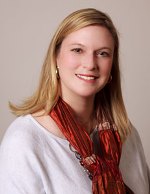 Kristen Slack’s research focuses on understanding the role of poverty and economic hardship in the etiology of child maltreatment, with a particular emphasis on child neglect. She is also interested in the caseload dynamics of child welfare systems in relation to other public benefit systems, such as Temporary Assistance for Needy Families, and in community-based programs designed to prevent child maltreatment. Her work advances approaches to better coordinating services and benefits to effectively address the economic needs of families at risk for child maltreatment, and improved assessment strategies for identifying risks and protective factors related to child neglect. Her research is primarily supported by the Doris Duke Charitable Foundation, the Wisconsin Children’s Trust Fund, and the National Institute of Child Health and Human Development.
Kristen Slack’s research focuses on understanding the role of poverty and economic hardship in the etiology of child maltreatment, with a particular emphasis on child neglect. She is also interested in the caseload dynamics of child welfare systems in relation to other public benefit systems, such as Temporary Assistance for Needy Families, and in community-based programs designed to prevent child maltreatment. Her work advances approaches to better coordinating services and benefits to effectively address the economic needs of families at risk for child maltreatment, and improved assessment strategies for identifying risks and protective factors related to child neglect. Her research is primarily supported by the Doris Duke Charitable Foundation, the Wisconsin Children’s Trust Fund, and the National Institute of Child Health and Human Development.
Neil MacInnes-Barker
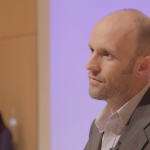 Neil MacInnes-Barker is the Founder and Executive Director of Voice Us, a Commissioner for the City of Cambridge, an Air Force veteran, and a born-again social advocate. Coming from humble means, MacInnes-Barker experienced the still-present disconnect between those in desperate need of change and those in a position to facilitate that change. His mission as a public speaker, documentary filmmaker, and app developer is to bridge this gap so that those who are suffering have a voice and are heard. A trailer for his latest documentary, No Place Like Home, can be found at his organization’s website, IPCNOW.ORG.
Neil MacInnes-Barker is the Founder and Executive Director of Voice Us, a Commissioner for the City of Cambridge, an Air Force veteran, and a born-again social advocate. Coming from humble means, MacInnes-Barker experienced the still-present disconnect between those in desperate need of change and those in a position to facilitate that change. His mission as a public speaker, documentary filmmaker, and app developer is to bridge this gap so that those who are suffering have a voice and are heard. A trailer for his latest documentary, No Place Like Home, can be found at his organization’s website, IPCNOW.ORG.
Sam Greenberg
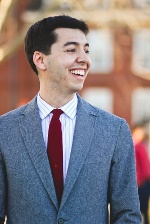 Sam Greenberg is Co-Executive Director of Y2Y Harvard Square, the nation’s first student run homeless shelter for young adults, which will open in November 2015. Sam is a graduate of Harvard College ‘14, where he studied History and Literature, writing his honors thesis on homelessness in Harvard Square. At Harvard, Sam served as the Staff Director of the Harvard Square Homeless Shelter, the first student run homeless shelter in the country, and as the Vice President of the Phillips Brooks House Association, a student lead nonprofit at Harvard College. Sam is a Draper Richards Kaplan Foundation Entrepreneur and an Elliot and Anne Richardson Fund Fellowship recipient. Sam is interested in continuing to pursue affordable housing and homelessness policy work, and in his free time enjoys running, music, fall, and all things Boston sports.
Sam Greenberg is Co-Executive Director of Y2Y Harvard Square, the nation’s first student run homeless shelter for young adults, which will open in November 2015. Sam is a graduate of Harvard College ‘14, where he studied History and Literature, writing his honors thesis on homelessness in Harvard Square. At Harvard, Sam served as the Staff Director of the Harvard Square Homeless Shelter, the first student run homeless shelter in the country, and as the Vice President of the Phillips Brooks House Association, a student lead nonprofit at Harvard College. Sam is a Draper Richards Kaplan Foundation Entrepreneur and an Elliot and Anne Richardson Fund Fellowship recipient. Sam is interested in continuing to pursue affordable housing and homelessness policy work, and in his free time enjoys running, music, fall, and all things Boston sports.
Sarah Rosenkrantz
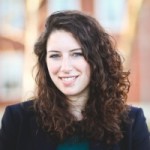 Sarah Rosenkrantz graduated from Harvard College, where she studied Social and Cognitive Neuroscience. Passionate about homelessness advocacy since high school, she started working at the Harvard Square Homeless Shelter (HSHS) her freshman fall. There, Sarah served as the Resource Advocacy Director, training and supporting students who connected guests with services necessary to transition out of homelessness. She has experience in peer counseling, research management, and marketing. A Draper Richards Kaplan Foundation Entrepreneur and a Phillips Brooks House Association (PBHA) Stride Fellow, Sarah is excited to continue leading Y2Y Harvard Square and hopes to pursue a career in homelessness and housing.
Sarah Rosenkrantz graduated from Harvard College, where she studied Social and Cognitive Neuroscience. Passionate about homelessness advocacy since high school, she started working at the Harvard Square Homeless Shelter (HSHS) her freshman fall. There, Sarah served as the Resource Advocacy Director, training and supporting students who connected guests with services necessary to transition out of homelessness. She has experience in peer counseling, research management, and marketing. A Draper Richards Kaplan Foundation Entrepreneur and a Phillips Brooks House Association (PBHA) Stride Fellow, Sarah is excited to continue leading Y2Y Harvard Square and hopes to pursue a career in homelessness and housing.
Emily Kernan
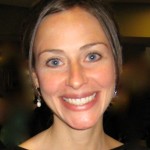 Emily Kernan is an Associate Director at NYU Law School’s Public Interest Law Center (PILC), where she advises students and alumni about public interest opportunities and organizes programs to educate students about public service and to prepare them for careers in the public interest. Prior to joining PILC in August of this year, Emily was a staff attorney at Advocates for Children, where she worked on Project Achieve to improve educational outcomes for children involved in the child welfare system. Emily provided individual advocacy and direct representation for students and families and also worked to build the capacity of foster care agencies to better identify and address children’s educational needs.
Emily Kernan is an Associate Director at NYU Law School’s Public Interest Law Center (PILC), where she advises students and alumni about public interest opportunities and organizes programs to educate students about public service and to prepare them for careers in the public interest. Prior to joining PILC in August of this year, Emily was a staff attorney at Advocates for Children, where she worked on Project Achieve to improve educational outcomes for children involved in the child welfare system. Emily provided individual advocacy and direct representation for students and families and also worked to build the capacity of foster care agencies to better identify and address children’s educational needs.
Before joining Advocates for Children, Emily served as Director of the Mental Health Advocacy Project at Lawyers For Children. In this capacity, she represented children in foster care with mental health issues in family court proceedings. She also engaged in policy work to tackle systemic problems, such as the over-prescription of psychotropic medications to children in care. Emily started this project as a Skadden Fellow after she graduated from Harvard Law School in 2007.
While at HLS, Emily actively participated in the Child Advocacy Program and served as Co-President of the student organization Child and Youth Advocates. Through the Child Advocacy Clinic, Emily worked with a Washington State Court of Appeals Commissioner to develop court reforms to expedite permanency for children in foster care. She also worked at Harvard’s Trauma and Learning Policy Initiative to help children exposed to family violence obtain necessary school-based services. Emily spent her summers at the National Center for Youth Law in Oakland, California, where she assisted with policy work and impact litigation on behalf of children in foster care, and at the Legal Services Center of The Door in New York City, where she advised and represented youth with foster care, education, housing, employment, and immigration problems.
Emily received a B.A. in Psychology with a concentration in Child Development from Duke University in 2003. She co-authored an article in Applied Developmental Psychology assessing the likely impact and effectiveness of the Adoption and Safe Families Act using research on child development.
Jesse Hahnel
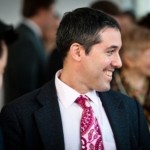 Jesse Hahnel is Founder and Director of FosterEd, an initiative of the National Center for Youth Law that improves the educational outcomes of students in foster care. Mr. Hahnel has served as a public school teacher in Washington DC and New York City, as Senior Analyst at the KIPP Foundation, and as an attorney working to ensure at-risk children receive the educational supports and services they need. Mr. Hahnel graduated Harvard University magna cum laude, Stanford Law School order of the coif, and has been named a State Bar of California Pfeiffer Scholar, a Justice John Paul Stevens Public Interest Fellow, a University of Michigan Bergstrom Child Welfare Law Fellow, and a Skadden Foundation Fellow. In recognition of his work on behalf of foster children he is one of seven national Fellows supported by The Mind Trust. He is the author of numerous publications, including The Other Achievement Gap: Court Dependent Youth and Education Law, published June, 2012, in the Journal of Law and Education. After a national search, The Center for the Study of Social Policy (CSSP) recently named FosterEd one of 15 exemplary initiatives found to help foster youth thrive.
Jesse Hahnel is Founder and Director of FosterEd, an initiative of the National Center for Youth Law that improves the educational outcomes of students in foster care. Mr. Hahnel has served as a public school teacher in Washington DC and New York City, as Senior Analyst at the KIPP Foundation, and as an attorney working to ensure at-risk children receive the educational supports and services they need. Mr. Hahnel graduated Harvard University magna cum laude, Stanford Law School order of the coif, and has been named a State Bar of California Pfeiffer Scholar, a Justice John Paul Stevens Public Interest Fellow, a University of Michigan Bergstrom Child Welfare Law Fellow, and a Skadden Foundation Fellow. In recognition of his work on behalf of foster children he is one of seven national Fellows supported by The Mind Trust. He is the author of numerous publications, including The Other Achievement Gap: Court Dependent Youth and Education Law, published June, 2012, in the Journal of Law and Education. After a national search, The Center for the Study of Social Policy (CSSP) recently named FosterEd one of 15 exemplary initiatives found to help foster youth thrive.
Jessica Berry
Jessica Berry is the Deputy Director at the Children’s Law Center of Massachusetts (CLCM). She earned her B.A. from the University of Chicago, graduated magna cum laude from the University of Michigan Law School, and earned a master’s degree in social work from the University of Michigan. Following law school, Jessica clerked for the Honorable Nathaniel M. Gorton of the United States District Court for the District of Massachusetts, and then for the Honorable Diana Gribbon Motz of the United States Court of Appeals for the Fourth Circuit. In 2009, she received a Skadden Fellowship to implement a project at CLCM to ensure that adolescents in child welfare cases have access to appropriate mental health and education services. Upon the conclusion of her fellowship, Jessica became a staff attorney at CLCM where she represents children in child welfare cases and appeals as well as in education and mental health matters. Jessica is a former vice chair of the Massachusetts Bar Association (MBA) Juvenile and Child Welfare Section Council. In 2014, she was the recipient of the MBA “Access to Justice Rising Star” award as well as a Lawyers Weekly’s Excellence in the Law “Up and Coming Lawyer” award.
Jessica is the author of a “Quick Reference on CBHI Mental Health Services for Youth” as well as a “Quick Reference on CRA (Children Requiring Assistance).” She provides trainings statewide to attorneys, parents, and service providers on mental health services for children, CRA cases, and educational stability for children in state custody.
Erin Corcoran
Erin B. Corcoran is a professor of law and the former executive director of the Warren B. Rudman Center for Justice, Leadership and Public Policy (2013-2014) and the Social Justice Institute (2009-2013). Professor Corcoran’s scholarship and presentations center on protecting non-citizens through systemic changes to the immigration system including providing government funded non-attorney legal representation, professionalizing the immigration prosecutors’ office and requiring best practices for adjudicating claims of unaccompanied minors seeking immigration relief.
In her classes, including Administrative Process and Immigration Law, Professor Corcoran demonstrates how legislation, administrative rules, and the courts are instrumental in shaping public policy. Students engage in problem-based learning that draws from current issues including: comprehensive immigration reform, the federal debt and deficit, and access to legal services for vulnerable populations.
In 2011, she was appointed to the New Hampshire Supreme Court’s Access to Justice Committee and in 2015, was appointed to serve on Executive Committee for the Commission. Professor Corcoran also serves on the Board of Trustees for the Friends Program. In addition, she provides pro bono representation to low income individuals through the New Hampshire Bar’s Pro Bono initiative and co-authored Representing Unaccompanied Children: Training Manual for KIND Pro Bono Attorneys.
As a faculty fellow at the Rudman Center, Professor Corcoran chairs the Rudman Center Summer Fellows selection committee. The Rudman Center provides modest stipends to students who work for government agencies or for organizations that perform public interest legal work. In addition, Professor Corcoran is the Bruce Friedman Pro Bono Coordinator and is responsible for providing regular programming to students on the value of pro bono legal work, as well as opportunities for students to engage in pro bono work while in law school.
Before joining UNH Law, Professor Corcoran was professional staff for the U.S. Senate Committee on Appropriations. Prior to working on the Appropriations Committee, Corcoran served as Counsel to U.S. Senator Barbara A. Mikulski. Professor Corcoran also served as Staff Attorney for Human Rights First, where she managed the Washington D.C. Asylum Representation Program. In addition, she worked for the Hebrew Immigrant Aid Society in New York City representing detained and non-detained refugees seeking asylum in the United States. Professor Corcoran was a consultant to the UN High Commissioner for Refugees in Zambia.
Elizabeth Badger
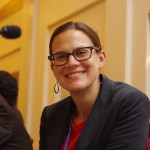 Elizabeth Badger is the Senior Attorney at the Boston Office of Kids In Need of Defense. She has worked in immigration law for the last 10 years in immigration legal services focused on representing non-citizen children, asylum-seekers, victims of crimes, and persons in prolonged immigration detention. She has received the National Immigration Project’s Daniel Levy Award for her work representing victims of workplace raids while at the Political Asylum/Immigration Representation (PAIR) Project, which awarded her in 2013 with its Pro Bono Mentor of the Year Award. From 2010-2013, Elizabeth taught in the Boston University School of Law’s Immigrants’ Rights Clinic. She has also worked extensively with the Massachusetts Law Reform Institute (MLRI) and other members of the Massachusetts immigration community on various law reform projects.
Elizabeth Badger is the Senior Attorney at the Boston Office of Kids In Need of Defense. She has worked in immigration law for the last 10 years in immigration legal services focused on representing non-citizen children, asylum-seekers, victims of crimes, and persons in prolonged immigration detention. She has received the National Immigration Project’s Daniel Levy Award for her work representing victims of workplace raids while at the Political Asylum/Immigration Representation (PAIR) Project, which awarded her in 2013 with its Pro Bono Mentor of the Year Award. From 2010-2013, Elizabeth taught in the Boston University School of Law’s Immigrants’ Rights Clinic. She has also worked extensively with the Massachusetts Law Reform Institute (MLRI) and other members of the Massachusetts immigration community on various law reform projects.
Sandra Cañas
 For nearly 23 years Sandra Cañas has dedicated her life to working with immigrant high school youth in Cambridge, MA. Sandra built the City Links program from the ground up, which is a testament to her dedication to serving immigrant youth by helping them assimilate into American society while preparing for college. Sandra always listens to the needs and wants of her students, then builds her lessons and activities to appeal to those needs while being incredibly informative and educational. Sandra has a broad range of experience coordinating volunteers, experience as a teacher and curriculum developer. She taught Spanish Literature courses at Cambridge Rindge and Latin School, was a parent coordinator for the Cambridge Public Schools Amigos Program, and served as coordinator of the Women’s Refugee Program at Centro Presente, a local nonprofit agency. Sandra is a former member of the Governor’s Advisory Council for Refugees and Immigrants, the School Council of the Cambridge Rindge School of Technical Arts, the Board of Directors of Centro Presente, and the Kid’s Council of the City of Cambridge. She has also coordinated and led educational and service learning groups of students and teachers to various Latin American countries including El Salvador, Cuba, the Dominican Republic and Guatemala. Sandra Cañas, a native of El Salvador, has made the United States her home for the last 36 years.
For nearly 23 years Sandra Cañas has dedicated her life to working with immigrant high school youth in Cambridge, MA. Sandra built the City Links program from the ground up, which is a testament to her dedication to serving immigrant youth by helping them assimilate into American society while preparing for college. Sandra always listens to the needs and wants of her students, then builds her lessons and activities to appeal to those needs while being incredibly informative and educational. Sandra has a broad range of experience coordinating volunteers, experience as a teacher and curriculum developer. She taught Spanish Literature courses at Cambridge Rindge and Latin School, was a parent coordinator for the Cambridge Public Schools Amigos Program, and served as coordinator of the Women’s Refugee Program at Centro Presente, a local nonprofit agency. Sandra is a former member of the Governor’s Advisory Council for Refugees and Immigrants, the School Council of the Cambridge Rindge School of Technical Arts, the Board of Directors of Centro Presente, and the Kid’s Council of the City of Cambridge. She has also coordinated and led educational and service learning groups of students and teachers to various Latin American countries including El Salvador, Cuba, the Dominican Republic and Guatemala. Sandra Cañas, a native of El Salvador, has made the United States her home for the last 36 years.
John Affeldt
 John Affeldt is a managing attorney at Public Advocates in San Francisco, where he focuses on educational equity issues through litigation, policy advocacy and partnerships with grassroots organizations. John served as a lead counsel on Williams v. California, which resulted in a breakthrough 2004 settlement guaranteeing California’s students sufficient instructional materials, decent facilities and qualified teachers. He is also lead counsel on Campaign for Quality Education v. California, a landmark state school funding challenge filed in 2010.
John Affeldt is a managing attorney at Public Advocates in San Francisco, where he focuses on educational equity issues through litigation, policy advocacy and partnerships with grassroots organizations. John served as a lead counsel on Williams v. California, which resulted in a breakthrough 2004 settlement guaranteeing California’s students sufficient instructional materials, decent facilities and qualified teachers. He is also lead counsel on Campaign for Quality Education v. California, a landmark state school funding challenge filed in 2010.
John has brought the only lawsuits in the country to enforce the teacher quality provisions of the federal No Child Left Behind Act, which require states and districts to provide fully credentialed, i.e., “highly qualified,” teachers in equal measure to low-income students and students of color. These actions have led to California strengthening its definition of the “highly qualified” teacher all students are owed; a state court voiding the improper labeling of some 4,000 provisionally-certified teachers as “highly qualified”; and a Ninth Circuit, U.S. Court of Appeals ruling striking down a federal regulation that unlawfully labels teachers still in training across the nation as “highly qualified.” In Association of Mexican-American Educators v. California, John won a precedent-setting en banc decision from the Ninth Circuit establishing that discriminatory teacher tests must be job-related, a result that forced California to reform its certification exam to the benefit of 50,000 test-takers annually.
John has worked on numerous school finance, teacher quality, equitable opportunity and accountability policies in Sacramento. As part of this work, in 2006 John co-drafted a state law that now requires all schools to report publicly their actual per-pupil expenditures by school site, the first such law in the country. In 2013 and 2014, John helped to shape several key provisions of California’s new school funding law known as the Local Control Funding Formula (LCFF). These new laws require schools to provide increased or improved services for high need students in proportion to the additional funds generated by such students, establish parental involvement as a new state priority, and require new levels of community engagement and transparency in school planning and budgeting statewide.
John is a founding member of the Campaign for Quality Education, Parents and Students for Great Schools, and the LCFF Equity Coalition, which are grassroots, community-based and advocacy coalitions working on statewide policy advocacy campaigns to improve educational opportunities for low-income students of color and to build power in low-income communities.
For his work, John has twice been recognized as a California Attorney of the Year, once in 2005 by California Lawyer magazine and again in 2010 by The Recorder. He has also been recognized as one of the top plaintiff lawyers in America by Law Dragon magazine.
Roberta Furger
Roberta believes in the power of stories and high-quality research to shift the public narrative and shape public policy. She recently joined the Learning Policy Institute (LPI), a new national education think tank, as senior writer. Prior to LPI, Roberta worked for 10 years with PICO California, the state’s largest community organizing network. Roberta anchored PICO California’s policy analysis and statewide education policy work, building the capacity of leaders and staff to influence bills and budgets to advance racial and economic justice. In her current position, Roberta returns to her roots as a professional journalist and writer. She has earned regional and national magazine awards, authored a book on gender and technology, and contributed to documentaries, journal articles, and books on K-12 schools. In her current role, Roberta leverages her 20 years of experience in print and multimedia journalism to make high-quality research accessible to everyone from policy makers to parents in order to shape policies and improve learning for all children.
Amy O’Leary
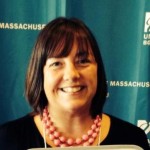 Amy O’Leary is director of Early Education for All, a campaign of Strategies for Children, an advocacy and policy organization that works to ensure that children in Massachusetts have access to high-quality early education and become proficient readers by the end of third grade. Amy joined EEA in 2002 as the early childhood field director and has also served as the Campaign’s deputy director.
Amy O’Leary is director of Early Education for All, a campaign of Strategies for Children, an advocacy and policy organization that works to ensure that children in Massachusetts have access to high-quality early education and become proficient readers by the end of third grade. Amy joined EEA in 2002 as the early childhood field director and has also served as the Campaign’s deputy director.
Prior to joining Strategies for Children, Amy worked as a preschool teacher and program director at Ellis Memorial in Boston. In 2011, Amy was elected to the governing board of the National Association for the Education of Young Children. She is a member of the Children’s Defense Fund Emerging Leader Fellowship and serves on the adjunct faculty at Wheelock College in Boston, Quinsigamond Community College in Worcester and Cambridge College in Cambridge. In addition, Amy serves on the Advisory Committee for the MA Department of Early Education and Care. Amy presents at national, state and local conferences and provides technical assistance to advocates and policy makers in other states.
Amy earned a Master in Public Administration degree from the Institute for Public Service at the Sawyer School of Management at Suffolk University. She holds a bachelor’s degree in psychology and early education from Skidmore College.
Alice Peisch
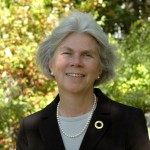 Since January 2003, Alice Peisch has served as the State Representative for the 14th Norfolk District, which currently includes the towns of Wellesley and Weston, as well as Precinct 4 in Wayland. Prior to her service in the legislature, Representative Peisch was active in Wellesley’s municipal government where she served on the Town’s Advisory (Finance) and School Committees, both of which she chaired, and as the Town Clerk. Representative Peisch’s previous legislative leadership positions include serving as the Vice-Chair of the Joint Committee on Revenue, as well as Chair of the Metrowest Caucus, both in the 2009-2010 session.
Since January 2003, Alice Peisch has served as the State Representative for the 14th Norfolk District, which currently includes the towns of Wellesley and Weston, as well as Precinct 4 in Wayland. Prior to her service in the legislature, Representative Peisch was active in Wellesley’s municipal government where she served on the Town’s Advisory (Finance) and School Committees, both of which she chaired, and as the Town Clerk. Representative Peisch’s previous legislative leadership positions include serving as the Vice-Chair of the Joint Committee on Revenue, as well as Chair of the Metrowest Caucus, both in the 2009-2010 session.
Currently, Representative Peisch serves as the House Chair of the Joint Committee on Education, a post she has held since 2011. In her role as Chair, Representative Peisch works on matters relating to education from birth through grade 12. During her tenure, she has tackled a broad range of issues on topics such as special education, charter schools, school discipline, education collaboratives, curriculum, school finance, and virtual schools.
For her work on education collaboratives, Representative Peisch received the 2012 Walt Turner Award from the national Association of Educational Service Agencies. She was also the recipient of the 2012 Massachusetts Association of School Committees’ Legislator of the Year award and the 2012-2013 Massachusetts Reading Association’s Reading Advocate Award. In 2014, Representative Peisch was recognized with the Distinguished Service Award by the Massachusetts Association of School Superintendents for her continued support of public education in the Commonwealth. In 2015, she received the Friend of MASBO Award from the Massachusetts Association of School Business Officials for her work on the state’s Foundation Budget Review Commission.
Representative Peisch also serves as a member of the Early Learning Fellows Program and the International Education Study Group, at the invitation of the National Conference of State Legislatures.
Representative Peisch received an A.B. from Smith College in 1976, a J.D. from Suffolk University in 1979, and a MPA from Harvard’s Kennedy School of Government in 2009.
Jason Sachs
Dr. Jason Sachs joined Boston Public Schools (BPS) as Director of Early Childhood in 2005 to oversee the expansion of Kindergarten 1 (K1) classes and coordinate kindergarten and pre-school programs for three, four, and five-year-olds.
Since its inception Dr. Sachs has led an effort to deliver a universal high-quality system of early childhood programs for BPS including the successful implementation of the K1 curriculum, professional development system for teachers and principals, expansion of National Association for the Education of Young Children (NAEYC) accredited classrooms in Boston which all helps prepare students for successful transition into the elementary grades, and a comprehensive evaluation system of both classroom quality and child outcomes.
In addition, Dr. Sachs has been working closely with the community through his work with the Community Partnership Council. In May 2008, Dr. Sachs was presented the Community Outreach award from Boston Association for the Education of Young Children (BAEYC), which recognizes an educator who has been able to establish relationships with community resources to support the achievement of program goals.
Previously, Dr. Sachs has worked in the Massachusetts Department of Education’s Early Learning Services division for six years as a research and policy consultant and was a former board member of NAEYC. He graduated from the Los Angeles Unified School District and received his Master’s in Applied Child Development from Tufts University and obtained his doctorate from the Harvard Graduate School of Education. Dr. Sachs currently lives in Somerville with his wife Elif and co-owns Moe Fencing in Somerville. This year their fencing club produced two youth national champions.
Jens Ludwig
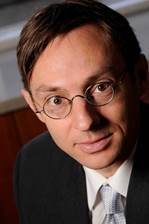 Jens Ludwig is the McCormick Foundation Professor of Social Service Administration, Law, and Public Policy at the University of Chicago. He is also Director of the University of Chicago Crime Lab and Co-Director of the University of Chicago Urban Education Lab, and he serves as the director of the new Crime Lab New York, which opened in 2014. Ludwig is a non-resident senior fellow in economic studies at the Brookings Institution, research associate at the National Bureau of Economic Research (NBER), and co-director of the NBER’s Working Group on the Economics of Crime. He is an economist by training and in 2012 was elected to the Institute of Medicine of the National Academies. His work on crime reduction and education interventions has shaped urban policy in Chicago and received nationwide news coverage in the New York Times and the Washington Post, and on NPR.
Jens Ludwig is the McCormick Foundation Professor of Social Service Administration, Law, and Public Policy at the University of Chicago. He is also Director of the University of Chicago Crime Lab and Co-Director of the University of Chicago Urban Education Lab, and he serves as the director of the new Crime Lab New York, which opened in 2014. Ludwig is a non-resident senior fellow in economic studies at the Brookings Institution, research associate at the National Bureau of Economic Research (NBER), and co-director of the NBER’s Working Group on the Economics of Crime. He is an economist by training and in 2012 was elected to the Institute of Medicine of the National Academies. His work on crime reduction and education interventions has shaped urban policy in Chicago and received nationwide news coverage in the New York Times and the Washington Post, and on NPR.
David Deakin
 David Deakin is the chief of the Family Protection and Sexual Assault Bureau and Senior Counsel to the District Attorney in the Suffolk County District Attorney’s Office in Boston. He supervises teams of lawyers, victim witness advocates, forensic interviewers and investigators, who investigate and prosecute cases of physical and sexual abuse of children, child homicide, domestic violence, and adult sexual assault. Before becoming chief of the Family Protection and Sexual Assault Bureau in 2004, Mr. Deakin served as chief of the Child Abuse Unit since 1998, and before that, he worked as an assistant district attorney in the Child Abuse Unit. From 1992 to 1996, Mr. Deakin worked as a prosecutor in the Norfolk County District Attorney’s Office. Upon graduation from Harvard Law School in 1991, Mr. Deakin clerked for The Honorable Ruth I. Abrams, then an associate justice of the Massachusetts Supreme Judicial Court. Mr. Deakin holds bachelor’s degrees in English from Williams College and Oxford University.
David Deakin is the chief of the Family Protection and Sexual Assault Bureau and Senior Counsel to the District Attorney in the Suffolk County District Attorney’s Office in Boston. He supervises teams of lawyers, victim witness advocates, forensic interviewers and investigators, who investigate and prosecute cases of physical and sexual abuse of children, child homicide, domestic violence, and adult sexual assault. Before becoming chief of the Family Protection and Sexual Assault Bureau in 2004, Mr. Deakin served as chief of the Child Abuse Unit since 1998, and before that, he worked as an assistant district attorney in the Child Abuse Unit. From 1992 to 1996, Mr. Deakin worked as a prosecutor in the Norfolk County District Attorney’s Office. Upon graduation from Harvard Law School in 1991, Mr. Deakin clerked for The Honorable Ruth I. Abrams, then an associate justice of the Massachusetts Supreme Judicial Court. Mr. Deakin holds bachelor’s degrees in English from Williams College and Oxford University.
Joshua Dohan
Joshua Dohan is the Director of The Youth Advocacy Division (YAD) of the Committee for Public Counsel Services (CPCS). Joshua Dohan became a public defender in 1988 and joined YAD (at that time the Youth Advocacy Project), at its inception, as its first staff attorney in 1992 and assumed the role of Director in 1999. YAD’s 450 lawyers and social workers use a Youth Development Approach to advocating for all indigent children and youth accused of crimes in Massachusetts. Mr. Dohan is on the Board of Directors of Citizens for Juvenile Justice and is President of the Board for the Youth Advocacy Foundation. He is a member of the Community Advisory Board of the Institute on Race and Justice (Northeastern University) and a founding member of the Child Welfare and Juvenile Justice Leadership Forum. He also serves on the Institutional Review Board for Tufts University and the Social Justice Task Force of the Boston Police Department. In 2001, YAD became the first Juvenile Defender organization to win the Clara Shortridge Foltz award for outstanding achievement from the National Legal Aid and Defender Association. In 2011, Massachusetts was recognized as a Champion for Justice by the MacArthur Foundation for creating one of the first statewide juvenile defender departments in the country.
Michael Dsida
Michael Dsida is Deputy Chief Counsel for Massachusetts’s Committee for Public Counsel Services (CPCS), the state’s public defender agency. Mike oversees CPCS’s Children and Family Law Division (CAFL), which provides lawyers to children and indigent parents, primarily in child welfare/state intervention cases, and shares responsibility for management of CPCS as a whole. Within CAFL, Mike oversees the work of attorneys, social workers, and other staff in ten trial offices and an appeals office. He is also ultimately responsible for providing support to and oversight of about 750 private attorneys handling CAFL cases in the trial and appeals courts.
Most of Mike’s career as an attorney has been in the field of child welfare. Early in his career, Mike worked for the Cook County Public Guardian, representing clients in child welfare cases in Chicago’s Juvenile Court. Mike also worked extensively on systemic reform, including serving as plaintiffs’ counsel in Suter v. Artist M., 503 U.S. 347 (1992), in which he obtained an injunction mandating prompt assignment of social workers to children and parents, a ruling which was upheld by the Court of Appeals but ultimately reversed by the U.S. Supreme Court. Mike was lead counsel in other class actions as well. One of those cases ultimately required child welfare agencies and the court to abide by federal and state mandates regarding permanency planning for children; another led to better sibling visitation and placement policies and practices. He also handled a number of appeals of individual child welfare cases.
In 1995, Mike established and became the Director of the Civitas ChildLaw Clinic at Loyola University of Chicago School of Law, one of the first law school clinics in the country to concentrate on the representation of child clients. Mike trained students regarding the substantive law, practice skills, and ethical issues involved in Juvenile Court cases and supervised them in their representation of child and adolescent clients. He also established and managed the clinic’s law/social work interdisciplinary program. In addition, Mike helped train private firm lawyers to work as pro bono children’s advocates and helped train state and private agency caseworkers regarding court procedures.
Mike has also worked as an Assistant Corporation Counsel for the City of Chicago and as a Senior Legislative Attorney at the Wisconsin Legislative Reference Bureau. Mike is a graduate of the University of Chicago and Harvard Law School.
Felicia Ellsworth
Felicia Ellsworth has built a distinguished portfolio of work in the Litigation/Controversy Practice Group as a member of both the Appellate & Supreme Court Litigation Group and Business Trial Group. Her trial practice focuses on high-stakes complex commercial litigation in both state and federal courts, and her appellate practice spans both civil and criminal matters in the state and federal appeals courts, including the Supreme Court of the United States.
Ellsworth has counseled numerous clients in commercial disputes on issues including patent infringement, trade secret misappropriation, contract law, civil procedure, real property disputes, tort law, administrative law and procedure, and constitutional law. She has also counseled and represented clients in both civil and criminal appeals involving patent infringement, contract law, constitutional law, and criminal law and procedure. She has represented clients in Massachusetts and other state trial and appellate courts, including the Supreme Judicial Court, in administrative tribunals, as well as in federal district courts, courts of appeals, and the Supreme Court.
Throughout her time at the firm, Ellsworth has become deeply involved in numerous pro bono matters. Recently and significantly, she played a lead role in the Commonwealth of Massachusetts’ challenge to the constitutionality of DOMA, leading to the historic Supreme Court ruling favoring marriage equality. She remains involved in the fight for marriage equality nationwide, and is helping lead the firm’s representation of Gay and Lesbian Advocates and Defenders in various federal courts of appeals considering marriage equality issues in the Fourth, Sixth, Seventh and Tenth Circuits.
In addition to her marriage equality pro bono representations, Ellsworth has a robust pro bono practice that includes representing individuals seeking asylum based on religious and gender persecutions and individuals appealing their criminal convictions and sentences. She is a member of the First Circuit Court of Appeals Criminal Justice Act panel, through which she provides pro bono representation to indigent defendants on appeal.
Christopher Looney
Chris Looney focuses his practice on complex civil and criminal litigation. His civil litigation experience includes representing corporations in matters involving breach of contract, civil and government subpoenas, intellectual property disputes, and financial regulatory matters. He has also represented CEOs and other executives in criminal matters involving allegations of fraud, violations of the FCPA, and violations of other federal and state criminal statutes.
Immediately prior to joining WilmerHale, Looney was an associate at Williams & Connolly LLP in Washington DC. From September 2013 until September 2014, he clerked for Judge Douglas P. Woodlock of the US District Court for the District of Massachusetts. Before entering law school, he worked at the Federal Reserve Bank of New York as an economic analyst.
Looney is a member of WilmerHale’s Business Trial and Investigations and Criminal Litigation Groups.
Thomas Kane
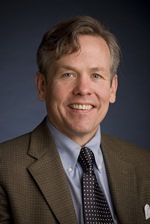 Thomas Kane is an economist and Walter H. Gale Professor of Education at the Harvard Graduate School of Education. He is faculty director of the Center for Education Policy Research, a university-wide research center that works with school districts and state agencies. Between 2009 and 2012, he directed the Measures of Effective Teaching project for the Bill & Melinda Gates Foundation. His work has spanned both K-12 and higher education, covering topics such as the design of school accountability systems, teacher recruitment and retention, financial aid for college, race-conscious college admissions and the earnings impacts of community colleges. From 1995 to 1996, Kane served as the senior economist for labor, education, and welfare policy issues within President Clinton’s Council of Economic Advisers. From 1991 through 2000, he was a faculty member at the Kennedy School of Government. Kane has also been a professor of public policy at UCLA and has held visiting fellowships at the Brookings Institution and the Hoover Institution at Stanford University.
Thomas Kane is an economist and Walter H. Gale Professor of Education at the Harvard Graduate School of Education. He is faculty director of the Center for Education Policy Research, a university-wide research center that works with school districts and state agencies. Between 2009 and 2012, he directed the Measures of Effective Teaching project for the Bill & Melinda Gates Foundation. His work has spanned both K-12 and higher education, covering topics such as the design of school accountability systems, teacher recruitment and retention, financial aid for college, race-conscious college admissions and the earnings impacts of community colleges. From 1995 to 1996, Kane served as the senior economist for labor, education, and welfare policy issues within President Clinton’s Council of Economic Advisers. From 1991 through 2000, he was a faculty member at the Kennedy School of Government. Kane has also been a professor of public policy at UCLA and has held visiting fellowships at the Brookings Institution and the Hoover Institution at Stanford University.
Anthony Watson
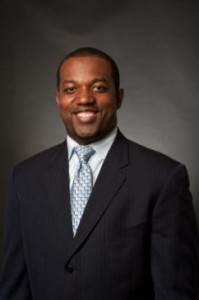 At his core A.J. Watson is about helping people thrive, not just survive. Over the course of his career he has worked across the public, private and non-profit sectors to meet people where they are and make connections that allow them to reach their full potential. As the Director of Youth Guidance’s Becoming A Man (BAM) program he is responsible for leading a team of 80 highly-trained BAM Counselors that meet young men where they are, both physically and emotionally, and take them on a journey to learn, practice and internalize the knowledge, skills, mindsets and values necessary to become a responsible and contributing man. And it’s working.
At his core A.J. Watson is about helping people thrive, not just survive. Over the course of his career he has worked across the public, private and non-profit sectors to meet people where they are and make connections that allow them to reach their full potential. As the Director of Youth Guidance’s Becoming A Man (BAM) program he is responsible for leading a team of 80 highly-trained BAM Counselors that meet young men where they are, both physically and emotionally, and take them on a journey to learn, practice and internalize the knowledge, skills, mindsets and values necessary to become a responsible and contributing man. And it’s working.
Results from a 2009-2010 randomized controlled study by the University of Chicago Crime Lab showed that BAM reduced violent crime arrests by 44% and other crime arrests by 36% and just as importantly increased future graduation rates by 10-23%. These results equate to an estimated annual ROI of between 18-24 percent according to the White House Council of Economic Advisors.
Prior to joining the Youth Guidance Executive Team, A.J. worked for CASEL, the leading organization in the field of Social and Emotional Learning (SEL), where he oversaw efforts to attract, develop and retain top-tier talent by creating a goal oriented, high-performance culture and supported CASEL’s policy and advocacy efforts. He is a former Education Pioneer Graduate School Fellow and has also done consulting work for IDEA Public Schools, a public charter school network in the Rio Grande Valley of Texas.
A.J. has also spent 13 years as an executive trainer and consultant for FOCUS Training, a leadership training and development firm, worked as an organizer for a gubernatorial campaign and held finance and sales roles for Fortune 200 firms such as GE, Target and Wells Fargo.
A.J. earned his MBA in human capital and strategy from the University of Michigan Stephen M. Ross School of Business and a BBA in finance and political science from Howard University. A.J. resides in Chicago with his wife Stacey and their two-year old daughter Gabrielle.
Anthony Ramirez-Di Vittorio
Anthony Ramirez-Di Vittorio, BAM Founder, currently manages the BAM Training Academy, which promotes and reinforces program fidelity through intensive counselor training. He is a licensed clinical professional counselor and has worked with Youth Guidance in Chicago, Illinois, since 1999. He founded the BAM program in 2001 in the Humboldt Park community, mainly serving Roberto Clemente High School and many feeder middle schools. He developed the BAM curriculum and served hundreds of students from “at-risk environments” throughout the Chicago area until 2009 when he launched the BAM Training Academy.
Anthony holds a Master’s degree in Professional Counseling Psychology from the Illinois School of Professional Psychology and a Bachelor’s degree in Psychology from the University of Illinois. He has worked in the field of mental health since 1992, specializing in adolescent and youth programs for males. Anthony is also a graduate of two men’s organizations: Victories of the Heart and The Mankind Project. These organizations provide modern day “men’s initiations” that lead to personal mission. Anthony’s mission is to “create a world where father and son live in harmony by mentoring male youth into men of character.”
Anthony is a second generation U.S. citizen. His grandparents came from Mexico on his mother’s side and Italy from his father’s side. He grew up in an at-risk environment on the southwest side of Chicago and is the first in his family’s history to go to college and graduate. He is a graduate of Kelly High School in Chicago, Illinois, where he spent his formative years as a street break-dancer. Anthony resides on the southwest side of the city with his family.
Gail Day
Gail S. Day, MSW, LSW is a state licensed Social Worker. She received her MSW from University of Illinois at Chicago, Jane Addams School of Social Work in 2002. She is employed by Youth Guidance, a school-based not-for-profit agency and has been working in both mental health and substance abuse programs for over 15 years. Her work has addressed a broad range of adolescent issues including, depression, trauma, anxiety, behavior disorders, academic school-related difficulties, social school-related difficulties, grief and loss, anger management, and substance use. She is currently the Program Manager for the Working on Womanhood (WOW) Program. She has supervised undergraduate students and graduate students from several colleges and universities in the Chicago area. Mrs. Day has conducted several workshops on Adolescent Development, Trauma and Stress Management for parent and teacher conferences. She also is a member of the Oak Park Multicultural Mental Health Advisory Committee which oversees the development and implementation of mental health practices in the village of Oak Park.
She is an adjunct professor at University of Phoenix since 2006 where she teaches undergraduate classes in Human Services and Psychology.
She is a member of the National Association for Social Workers and National Association of Black Social Workers (Chicago Chapter), and the Oak Park Multicultural Behavioral Health Advisory Committee, and holds certifications in Cognitive Behavioral Intervention for Trauma in Schools (CBITS), Think First, Non Violent Crisis Intervention, and Mediation/Neighborhood Restorative Justice. Mrs. Day has also been a member of Delta Sigma Theta, Inc. (Glen Ellyn Area Alumnae Chapter) since 2008 and has chaired and co-chaired several committees.


